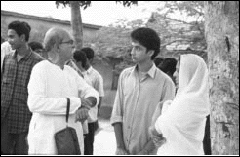|
審査員のことば
視覚には限界があるが、精神はこの限界から遥かに遠くにあり、ドキュメンタリー映画作家にとっては創作の道具となる。個人は経験を求め、その代償にたくさんの情熱と、そして哀しみを得る。
映画作家は何が必要とされているかを見極め、求められていないものを削り取る。それは彫刻家に似ている。硬い表面を作業し、必要なだけを削り取るのにどれだけ力を入れればいいかをいつも考えている。このプロセスを通じて、彼は隠された魂を導き出す。視覚の限界はかくして、創造者の道具だと説明することができる。彼の精神はこの仮定された限界を貫く鋭利な武器となるのだ。
例えば単純な自然現象―死がある。世界の北と南では、死についてまったく別の見方をする。東と西もまた然り。この死の視覚化は個人個人によって、地域地域によって異なる。それは社会から教えられたもの、プラス自分の「過去」から引き継いだ個人的記憶である。ここでドキュメンタリー映画作家は文学者となり、哲学者となる。彼はそれを、創造者として配合させるのだ。インドの世界観では、神は創造者として絶対である。その次の座は芸術家によって占められる。この神に次ぐ座とはなんだろう?真の芸術家が自分の視点を作り出そうと決意するときは常に、その視点は判断、意見、関心、配慮、思慮深さ、“精神性”への親しみといった、微妙に重なりあった層に作用する。この“精神性”を見ることができる人こそ、ドキュメンタリー映画作家と呼ぶことができるのだ。
この“精神性”とは何か?それは真実の探究だ。映画作家は自分自身の手段でそれを探究するー写真映像によって、音響によって、など。実人生は映画のコマの中に構成されているものではないが、映画は実人生の映像を理解し、共感することができる。かくして、映画作家は神に次ぐ座を発見するのだ。 |
Juror's Statement
Vision has limitations but mind is far free of these limits: it
becomes a creative tool for any Documentary filmmaker. The individuals
try to experience things and in return they receive passion and
sorrows.
The filmmaker identifies what is required and chisels out that
which is not wanted. We identify him as a sculptor: always working
on hard surfaces and deciding what pressure he should use on his
tool to discard the portions not wanted. By this process he brings
out the soul that is hidden. The limitations of vision can thus
be described as the tool to the creator. His mind becomes a sharp
implement to penetrate this faulty boundary.
For example, the simple natural phenomena--Death. The northern
and southern hemispheres have two entirely different ways of "
Seeing " death. Differences can be found in the East and West,
too. The visualization of death varies from person to person,
locale to locale. They are the sum of social inputs plus memories
inherited from the " Past. " Here the documentary filmmaker turns
into an author and a philosopher. He should blend like creator.
The Indian concept of God is as the ultimate, as a creator. The
next position is occupied by the artist. And of what is this position
composed? Whenever a genuine artist decides to create his precept,
he must deal with many delicate layers: judgment, opinion, concern,
considerations, thoughtfulness and affinity to " Spirituality.
" Who ever perceives this, " spirituality " can be called a Documentary
filmmaker.
What is this " spirituality " ? It is the search for truth. A
filmmaker searches for this via his own means, by the way of photography,
sound, etc. Life is something not be composed in frames of cinema,
but Cinema is one that understands and sympathizes with the images
of life. The Filmmaker, now finds his position next to God. |

